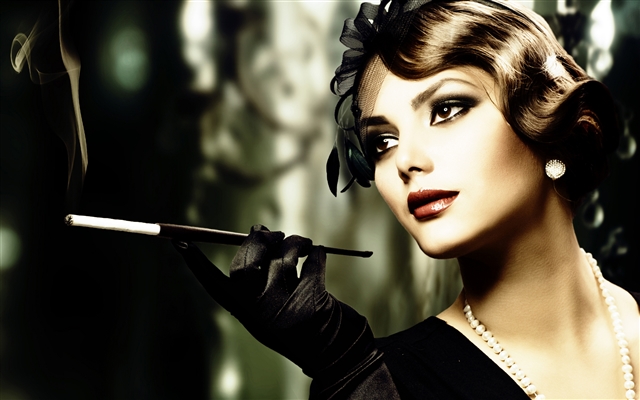Philologist Masha Nesterenko about favorite books
IN BACKGROUND "BOOK SHELF" we ask heroines about their literary preferences and editions, which occupy an important place in the bookcase. Today a philologist, editor of common place, the author of the Gorky portal Masha Nesterenko tells about favorite books.
INTERVIEW: Alice Taiga
PHOTO: Alyona Ermishina
MAKEUP: Anastasia Pryadkova

Masha Nesterenko
philologist
For a long time I could not imagine that reading books can become a profession, because everyone can read
 Reading in my family was always encouraged. When I learned to read, I do not remember exactly, but I remember that the first word I read was “bun”. And everything spun - as Averchenko wrote. I methodically re-read all the books that interested me in the house. Among them came across medical reference books of the grandmother-doctor, for some reason they terribly liked me. Hike to the library was a real treat: I just adored the smell of old books, which in my memories mixed with the smell of freshly painted floor and the scent of autumn colors. I walked with great pleasure between the huge shelves, went through the books, and then began to go to the library alone. I liked precisely the small regional libraries - so cozy, unlike the main central one.
Reading in my family was always encouraged. When I learned to read, I do not remember exactly, but I remember that the first word I read was “bun”. And everything spun - as Averchenko wrote. I methodically re-read all the books that interested me in the house. Among them came across medical reference books of the grandmother-doctor, for some reason they terribly liked me. Hike to the library was a real treat: I just adored the smell of old books, which in my memories mixed with the smell of freshly painted floor and the scent of autumn colors. I walked with great pleasure between the huge shelves, went through the books, and then began to go to the library alone. I liked precisely the small regional libraries - so cozy, unlike the main central one.
I always loved to read, but for a long time I couldn’t imagine that reading books can become a profession, because everyone can read, and a profession is something special that needs to be learned. Therefore, after the ninth grade, I entered the music school as a conductor of the choir, but did not last long and went to the literary class of the pedagogical lyceum.
My teenage period passed with Remarque, Borges, Marquez and the poets of the Silver Age. The summer before entering the pedagogical institute was remembered by the fact that it was necessary to re-read a huge array of books that were included in extracurricular reading. That summer there was a hellish heat, I sat in the country house and avidly read Trifonov, Dombrovsky, Sasha Sokolov and Dovlatov. There was a feeling of absolute happiness, the soundtrack for it was the AuktYon group, whose fierce fan I was at that moment.
Three years after graduation, I entered a doctoral program at the University of Tartu. The choice was not accidental: the work of Lotman was a kind of pass to the world of philology. The dream to get to the University of Tartu pursued me from the third course, but very few people knew about it, it seemed impossible for a student of the Taganrog Pedagogical Institute. Now my reading is determined by the dissertation and work.
With modern literature, the relationship I have not developed. The last book that hooked me was The Favorite Littella. With Russian-language literature is even more difficult. I used to try to write about it and, therefore, read a lot, and then I realized that if it doesn’t go, why torture myself, it doesn’t, because modern authors have merged for me into one monotonous hum of intellectual writing. The only exception was with Ksenia Buksha and her novel "Plant" Freedom "," where she turned to the tradition of the twenties, and Maria Galina, for whom I really follow.
A couple of years ago, a common place, a volunteer DIY project, appeared in my life - and this is the best thing that could happen to me. In February last year, we launched a special series "Ѳ", dedicated to fiction and memoir prose of forgotten Russian writers of the XIX-XX centuries. Several books have already been published in it: "Authorists and Poets. Female Criticism: 1830-1870", "Quilts of Quilt" by Lyubov Kopylova, "Anichkina Revolution" by Natalia Venkstern, "Front" by Larisa Reisner. I read a lot and look for new forgotten "authorizers", now there are still a few books in work, and we have big plans.
Modern authors have merged for me into one monotonous hum of intellectual writing

Alexander Kondratyev
"On the banks of Yaryn"
I met this novel about eleven years old, in the wake of my fascination with the mythology of different countries - it came to the Slavic one. It seems that the book in the series “I Know the World” (I'm not sure) recommended fiction on the topic. So I learned about Orestes Somov and Kondratiev’s “Kiev witches”.
Alexander Kondratyev - now half-forgotten poet and symbolist writer, creator of mythological novels on ancient and Slavic subjects. "On the shores of Yaryn" could be called an encyclopedia of everyday life of evil forces. The characters of the novel are the devils, mermaids, watermen, witches, drowned people of varying degrees of freshness and other vermin. If a person appears in their world, then more often as a guest. This is not at all an amusing reading, the fate of the heroes is rather tragic, although their problems differ little from the problems of mere mortals. The novel is full of literary allusions, starting with Gogol and the aforementioned Somov, ending with the works of contemporaries, and catching references is a separate pleasure.
Yuri Dombrovsky
"Faculty of unnecessary things"
I love both Dombrovsky's poems and his other prose, but the main things are the novels of the keeper of antiquities and the Faculty of Unwanted Things dilogy. For me, this book is primarily about how at the same time it is simple and difficult to be truly free, that you cannot make deals with the devil, whoever he pretends to be and whatever promises may be. It is for this feeling of freedom that I love him.
The “Faculty” is a wonderful late modernist novel, whimsically and intricately arranged: where it is necessary, written dryly, and where it is necessary - as colorful as suzanes. There are many places in my edition of the bookmark, but the book itself opens in two places - on the stage of interrogation of the main character by a young investigator (where she says that he studied unnecessary things at the faculty, and she was taught to establish the truth) and on the description of the Almaty market: "There are a lot of trucks. There are watermelons in the trucks. They are in bulk: white, gray, black, striped. Well done over them in T-shirts and cowboy coats - they grab one, the other, easily toss, jokingly catch, lean over the board to the buyer and shove it in ear: "Hear how the cracks "Eh! Look, a beard, I won’t take any money!” - they thrust the knife into the black-and-green striped side with a swing, a crunch is heard, and a red triangle is fluttering over the crowd at the end of the long knife ñ scarlet, living out of living tissue , cells, grains and crystals. " By the way, I am surprised that this novel has not yet been filmed, it would seem that it is asking.
Vladimir Odoevsky
"4338th year"
Vladimir Fedorovich Odoyevsky - one of my favorite writers and generally characters of the XIX century. Love began in childhood - with the "Town in the snuffbox". He was an amazing person who was engaged not only in literature, but also in music - he was fully established as a composer and was one of the founders of Russian musical criticism. He was also fond of the occult, for which he received the nickname "Russian Faust" and "your metaphysical luminosity." "4338th year", perhaps, now my favorite work with him, unfinished novel in the form of letters.
It is happening in the distant future - in the year 4338 - a comet is about to fall on Earth, Petersburg and Moscow were united into one city, only ruins remained from the “ancient Kremlin”, Vasilyevsky Island turned into a garden-reserve inhabited by huge horses, and the main character moves on galvanostat - the prototype of the aircraft. Even in the story you can see the foreshadowing of the Internet: "... magnetic telegraphs are arranged between familiar houses, by means of which those living at a far distance communicate with each other." The novel is very unusual for its time, because it was created in 1837, when science fiction in its current sense was not even mentioned.
Larisa Reisner
"Front"
Once a colleague in common place asked me: "Listen, have you read Racener?" And I - no, I did not read. That is, of course, I knew who Larisa Mikhailovna Reisner was, that among other things, she was also a writer. I found her lyrics - first "Front" and "Afghanistan" - and just fell in love. It turned out that this is my favorite type of prose of the twenties: seemingly a journalistic essay, a strong mix of naturalism and expressionism. Speech, as it is not difficult to guess, about the everyday life of the Civil War.
Racener is not hiding behind the figure of the narrator, but, surprisingly, it is very difficult to grasp it. She seemed to be turned into sight, hearing, smell — strict fixation of the events. Then I found her "Autobiographical novel" (it was not finished), several critical essays - and we made a book, called it by one of the texts. Philosopher Alla Mitrofanova wrote a wonderful preface. It turned out to be a very personal thing for me, because in the course of my work I fell firmly in love with prose and the very image of Reisner - a female commissar nicknamed Ionian Curl, most of all loving little barrel organ, ice cream and nibbling cabbage stumps. That I remembered her.
Alice Poret
"Notes. Drawings. Memories"
Once I had a long, rather difficult period, during which the only entertainment I saw was a 16-hour dream. I could neither read, nor watch a movie, nor listen to music — everything was so bad. Once I decided to make myself a present: I bought the book of Alice Poret, first the first part. And - about a miracle - funny stories and vivid pictures gradually returned to me an interest in reading and everything else.
Poret worked on the "Notes" in the late 1960s, many years after the events described. On each page of the book - a small anecdotal or lyrical story. Poret writes about his childhood, his days of study, the white dog Hokusai, his friendship with Kharms, who once specially brought bedbugs to the house of Ivan Ivanovich Sollertinsky, and many others. Reading these memories, you fall into a wonderful world, where there is no sorrow and grief.
Victor Duvakin
"Conversations with Eugene Lang. Memories of Mayakovsky and Futurists"
Memoirs is one of my favorite kinds of literature, I read a lot and constantly. I especially love to find them in literary archives - at this moment there is a feeling that you have a precious treasure. "Conversations with Eugene Lang" came out this summer. The mainline of the conversation between Duvakin and Lang is her relationship with Mayakovsky, but the artist’s memoirs are remarkable not only for this, or even for her meetings with Einstein and Steiner. Lang is interesting in itself, in one of her life has contained as many as three: before the revolution, emigration and return in the fifties, and, of course, her creative activity, about which the book does not say very much.
What surprises Lang in the memoirs is the absolute lack of posture inherent in many memoirists. After reading, there remains a surprisingly light sensation: Lang tells many funny and touching stories about how he and Mayakovsky bought pies and ate them at the bell tower, about how, together with Durov, they rode around Moscow in a sleigh pulled by a camel, and the boys shouted to them following: “Camel th! Mayako-o-ovsky! Doo-uu! “
Yuri Lotman
"Conversations about Russian culture"
What can I say - the foundation of the basics. With "Conversations" I first met in the form of a cycle of transmissions, which were often used to spin around "Culture". I remember that day very well. I came from school, the TV was working in the kitchen, my mother warmed up the soup. And I stared at the screen and could not tear myself away: I was fascinated by this face, intonation. I simply could not believe that it was possible to speak about history and literature in such a way that in general they have such a dimension: life, culture — it all seemed separate. The school taught history quite traditionally: there are key figures, and there are masses, well, for example, peasants. Literature is rather from some moral and ethical positions (Katerina did well or not and so on).
Stuck with a spoonful of soup at my mouth, I thought that, in fact, I don’t understand anything at all, even in my favorite literature. And most importantly, Lotman talked about all this as if everyone could easily take possession of this knowledge — it was infectious and very important. In his works, Lotman does not shield the reader with a veil of snobbery. Then there were "Comments to Eugene Onegin" and much more. To this day, re-reading the work of Lotman, I have a feeling of gratitude for the ability to talk about the complex in simple and easy language. He seems to be winking at the book: "You can do that, too."
Vladislav Khodasevich
"Poems"
In adolescence and adolescence, I had a huge number of favorite poets: from Basilisk Gnedov to Soviet poet Leonid Martynov - I was finding with everyone how to profit. But the older I get, the less there are poets who I want to re-read all the time, and Vladislav Khodasevich is one of those authors. About the poems, at least for me, it is difficult to say why he, and not the other. In short, at Khodasevich I like his sad, sometimes sullen intonation. I sentimentally dragged the volume of his poems from Taganrog when I moved to Moscow, and then to Tartu.
Toril Mine
"Sexual / Textual Policy"
This book has become my personal guide to the history of feminist literary studies, although it itself has long been a part of this story, since it was written back in the eighties. This is one of the classic works in the field of feminist literary criticism. I am writing a thesis on the professionalization of female literary labor in Russia in the 19th century, but I rarely use feminist tools. However, the topic requires to understand the history of the issue.
My talk is about two main schools: Anglo-American and French. In the first case, the term "politics" is important, which is interpreted as the realization of relations of domination and subordination. This direction was developed mainly by researchers of the English-speaking world. The second grew out of European philosophy and developed in France. In my opinion, there is no better book to sort out these issues: despite the fact that feminist criticism has developed further, what My Toril writes is the base.
Franco Moretti
"Further reading"
Ham philologists, lucky that this book was translated into Russian. "Further reading" is not even a manifesto, but a program for updating the methodology for studying literature. Moretti's approach may be unusual for someone, since he proposes to study literature as a species. The main pathos of the "Far Reading" is directed against what can be called the sacralization of the canon - which I personally am very impressed with, since I myself am engaged in poetess who are not members of the classical canon.
Perry anderson
"Reflections on Western Marxism"
Perry Anderson is a historian, sociologist and political scientist, one of the leading Marxist intellectuals of our time and the main theorists of the "new left" movement, the brother of Benedict Anderson, the same one who wrote the beloved book Imaginary Communities. "Reflections on Western Marxism," recently reprinted in common place, is a mastrid for anyone who wants to understand the currents of Western Marxism, you can take it as a very clearly written textbook. Anderson views Marxist philosophy as a single intellectual tradition. Often re-read to refresh in memory. Recently, Anderson’s book, The Twists and turns of Hegemony, was published in Russian, I haven’t read yet, but I really want to.




